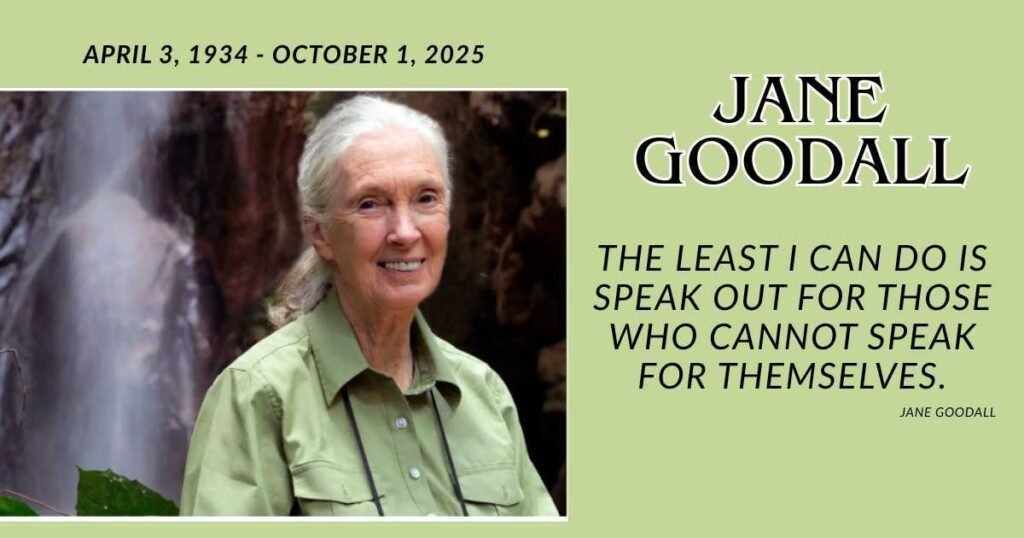Jane Goodall Died at 91: Her Legacy in Primate Research and Conservation
Jane Goodall died as one of the most famous scientists of the 20th and 21st centuries, known for her amazing work with chimpanzees and her efforts to save the planet. On October 1, 2025, Jane Goodall died at the age of 91, leaving behind a legacy that will never be forgotten. She spent her life studying animals, helping people understand the importance of protecting wildlife, and inspiring young people to take action for the environment. Her research and ideas changed the way we view animals and our relationship with the natural world.
Early Life and Inspiration
Jane Goodall was born on April 3, 1934, in London, England. From a young age, she loved animals and dreamed of one day going to Africa to study them. Jane’s parents were very supportive of her love for animals, and when she was just a child, they gave her a small stuffed toy chimpanzee named “Jock.” This sparked her curiosity about chimpanzees and set her on the path to becoming a world-renowned scientist.
In 1957, at the age of 23, Jane traveled to Kenya, Africa, to follow her dream. She didn’t have a formal university education, but her passion for animals and her determination caught the attention of famous scientist Dr. Louis Leakey. Dr. Leakey believed in Jane’s potential and asked her to study chimpanzees in Gombe Stream National Park, Tanzania. This was the start of her amazing career.
The Gombe Stream Research
Jane’s research in Gombe Stream National Park changed the world’s understanding of chimpanzees. She spent years observing them in the wild, taking detailed notes about their behavior. What she discovered was revolutionary. Jane found that chimpanzees use tools, just like humans. They would use sticks to fish for termites or leaves to wipe their faces. This was a huge discovery because, at the time, scientists believed that only humans used tools.
Jane also observed that chimpanzees have complex social structures. They communicate with each other using different sounds and gestures, much like humans. They have friendships, form families, and even experience emotions like joy and sadness. Jane’s observations showed that humans and chimpanzees have more in common than anyone had realized before.
The Jane Goodall Institute
In 1977, Jane founded the Jane Goodall Institute, a non-profit organization dedicated to wildlife research, conservation, and education. The institute’s work is focused on protecting chimpanzees, their habitats, and other endangered animals. It also works to empower young people to take action for the environment.
One of Jane’s most important projects was Roots & Shoots, a program she started to teach young people about the importance of protecting the planet. The program encourages students to take part in community service projects that help animals, people, and the environment. Today, Roots & Shoots has over 35,000 members in more than 100 countries, making it one of the largest youth programs in the world.
Advocacy and Global Recognition
While Jane started her career as a researcher, she eventually became a powerful voice for conservation. She traveled all over the world, speaking about the importance of protecting wildlife and the environment. Her messages about sustainability, protecting endangered species, and the dangers of deforestation were heard by millions of people.
Jane received many awards for her work, including honorary degrees from universities and recognition from world leaders. Her efforts were also supported by many celebrities, such as Prince Harry and Meghan Markle, who praised her for her dedication to conservation and her work with young people. Leonardo DiCaprio, the famous actor and environmental activist, called Jane “a true hero for the planet” after her death.
How Jane Goodall Died
Jane Goodall died on October 1, 2025, while on a speaking tour in Los Angeles, California. Jane Goodall died peacefully in her sleep due to natural causes, at the age of 91. The news of her death saddened the world, but her life’s work continues to inspire millions of people, especially those passionate about conservation and animal rights. Throughout her life, Jane remained dedicated to her mission of protecting wildlife and educating the world about the importance of living in harmony with nature. Jane Goodall died due to natural causes related to the aging process, which is common for people who live long and meaningful lives like hers.
Legacy and Lasting Impact

Jane Goodall died, but her work has left a lasting impact on the world. She has inspired millions of people, especially young people, to care about the planet and take action for the environment. Her research on chimpanzees helped us understand that humans are not so different from other animals. It also showed the importance of protecting wildlife and preserving habitats before they are destroyed by human activity.
Her institute continues to protect chimpanzees and other wildlife, while also working to promote sustainable development in areas where these animals live. The Roots & Shoots program has motivated many young people to get involved in conservation, and it continues to inspire new generations to fight for a better future.
Conclusion
Jane Goodall’s life and work will always be remembered. Her research about chimpanzees changed the way we see animals, and her efforts to protect wildlife have inspired millions of people to make a difference in the world. Even though Jane has passed away, her legacy lives on through the Jane Goodall Institute, the Roots & Shoots program, and the countless people she inspired. Jane showed us that one person can make a huge difference, and her message of hope, kindness, and action continues to motivate us all to protect our planet and its creatures.
For different information, visit our site daily life ways.











